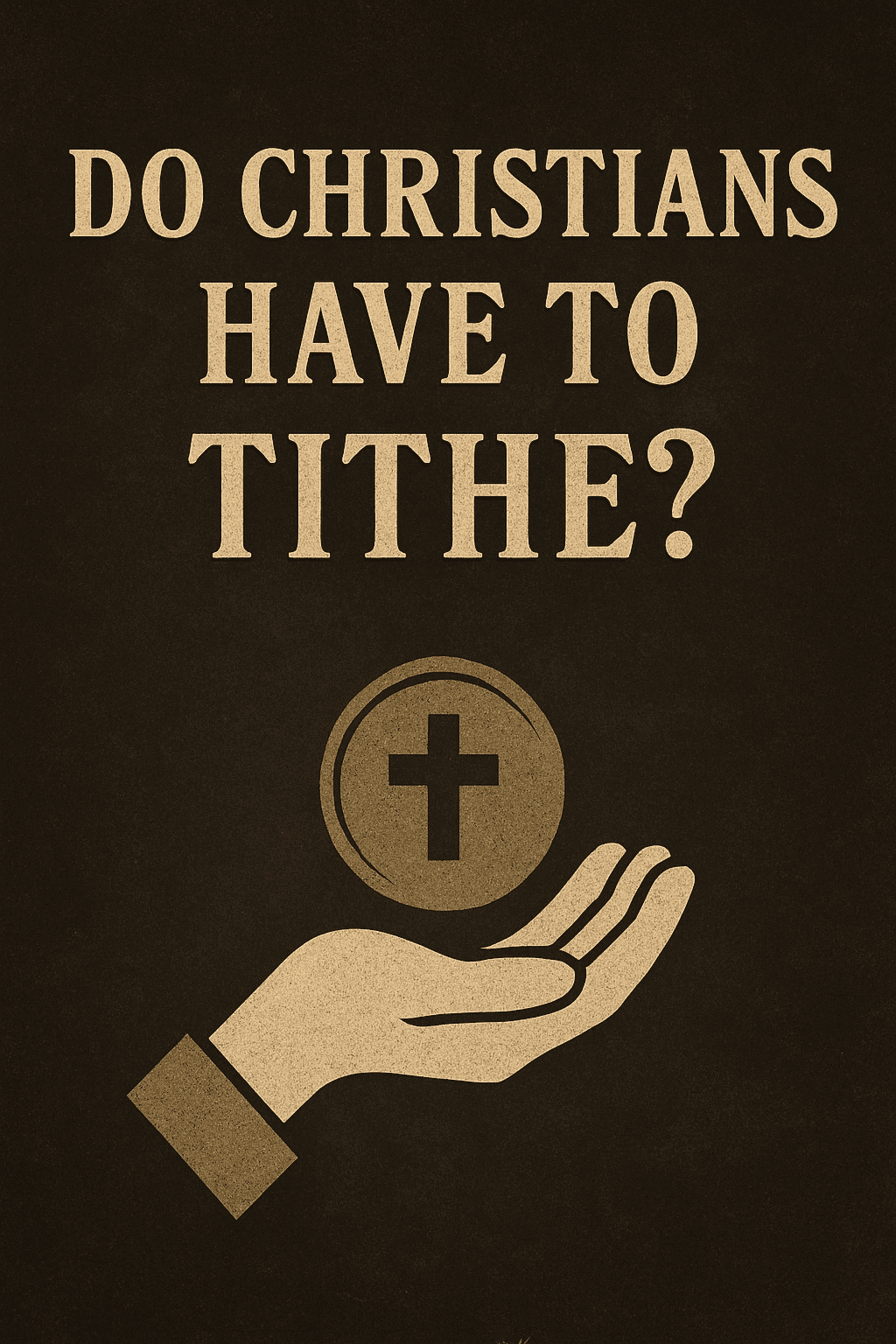Do Christians Have to Tithe? What the Bible Really Says About Giving
Tithing. It’s one of those topics that keeps coming up in Christian circles. Some say if you’re not giving 10% of your income to the church, you’re robbing God. Others argue that tithing was an Old Testament law that no longer applies. So, do Christians have to tithe?

A Question That Won’t Go Away
I’ve wrestled with this question myself. I want to be faithful in my giving, but I also don’t want to follow traditions just because someone says I should. I want to know what God’s Word actually says. If you’ve ever asked yourself the same question, stick with me. We’re going to dive into Scripture and uncover the real biblical teaching on giving—one that goes far beyond a simple percentage.
What Was Tithing in the Old Testament?
Let’s start at the beginning.
Tithing wasn’t just about handing over 10% of your paycheck. In ancient Israel, it was a system built into God’s covenant with His people. It wasn’t optional. It was law.
- Genesis 14:19-20 – The first mention of a tithe is when Abram gave a tenth of his spoils to Melchizedek, a priest of God. But notice—this wasn’t a command. Abram did it voluntarily.
- Leviticus 27:30-32 – Later, under the Mosaic Law, the tithe became a requirement. A tenth of everything—crops, livestock, income—belonged to God.
- Numbers 18:21-24 – Tithes were used to support the Levites, who had no land inheritance and were responsible for the temple.
- Deuteronomy 14:22-29 – Every three years, a special tithe was also collected to help the poor, widows, and orphans.

So, tithing in the Old Testament was about funding the religious system of Israel, not just dropping money in a collection plate. It was part of how Israel functioned as a theocracy. But here’s the key question: Does this Old Testament system apply to Christians today?
Do Christians Have to Tithe According to the New Testament?
This is where things get interesting.
When we step into the New Testament, the conversation shifts. The question is no longer “How much should I give?” but “What is the heart behind my giving?”
Let’s look at what Jesus said:
- Matthew 23:23 – Jesus rebuked the Pharisees for tithing their spices while neglecting justice, mercy, and faithfulness. He didn’t abolish tithing, but He made it clear—God cares more about the heart behind our giving than the percentage.
- Luke 11:42 – Jesus makes the same point again. The problem wasn’t tithing itself; it was legalism—giving out of obligation rather than love for God and others.
What about the early church?
- Acts 2:44-45 – The first believers didn’t just give 10%—they gave everything they had to support each other.
- 2 Corinthians 9:6-7 – Paul gives a clear principle for Christian giving:
“Each one must give as he has decided in his heart, not reluctantly or under compulsion, for God loves a cheerful giver.”
Notice what’s missing? A required percentage. There is no command in the New Testament for Christians to tithe. Instead, believers are called to give freely, generously, and joyfully.
But what about Hebrews 7? Doesn’t it mention tithing?
- Hebrews 7:1-10 – This passage talks about Abraham’s tithe to Melchizedek, but it’s used to show how Christ’s priesthood is greater than the Levitical system. It’s not a command for Christians to tithe.
So, do Christians have to tithe? No. But does that mean we’re off the hook when it comes to giving? Also no.
The Heart of Giving: How Should Christians Give Today?
If we’re not bound by the Old Testament tithe, then how should we approach giving?
The New Testament gives us three key principles:

- Give Generously – Paul praised the Macedonian believers because they gave beyond their means (2 Corinthians 8:3-5). Giving isn’t about a set percentage—it’s about a heart of generosity.
- Give Joyfully – “God loves a cheerful giver” (2 Corinthians 9:7). If you’re giving out of guilt or pressure, that’s not biblical giving. True giving is an act of worship, not duty.
- Give Sacrificially – Jesus praised the widow who gave her two small coins because she gave out of her poverty (Mark 12:41-44). God values the sacrifice, not the amount.
What does this mean practically? It means we should support the church, help those in need, and invest in the work of the Kingdom. But not because we have to. Because we want to.
Answering Common Questions About Tithing
Let’s tackle some common concerns:
- Is tithing required for salvation?
No. Salvation is by grace through faith (Ephesians 2:8-9). Giving doesn’t earn us favor with God—it’s a response to His grace. - Will God bless me more if I tithe?
Some preach a “prosperity gospel” that says if you give more, God will make you rich. But biblical giving isn’t a transaction—it’s an act of trust and obedience (2 Corinthians 9:10-11). - What if I can’t afford to give 10%?
Start with what you can give joyfully. The amount isn’t as important as the heart behind it (Mark 12:43-44). - Where should I give?
Support your local church (1 Corinthians 16:2), missions, and the poor (Proverbs 19:17).
Do Christians Have to Tithe?
So, do Christians have to tithe?
The simple answer is no—there is no New Testament command requiring believers to give 10%. But does that mean we stop giving? Absolutely not.
God calls us to something greater than tithing—joyful, generous, sacrificial giving. Not because we have to, but because we get to. Because everything we have belongs to Him anyway.
So, what about you? Is your giving a reflection of gratitude and trust in God? Are you supporting the work of the Kingdom with an open hand and a willing heart?

Call to Action
What are your thoughts? Have you wrestled with this question before? I’d love to hear from you. Drop a comment below or send me a message. Let’s dig into God’s Word together! Do you prefer watching videos? Check out my YouTube channel!
Would you like to know what the Bible says about election or predestination? Read my free pamphlet Chosen by Grace.
Walt Roderick is a Christian writer who cares more about biblical clarity than online applause. He writes to strengthen believers and confront spiritual drift.






